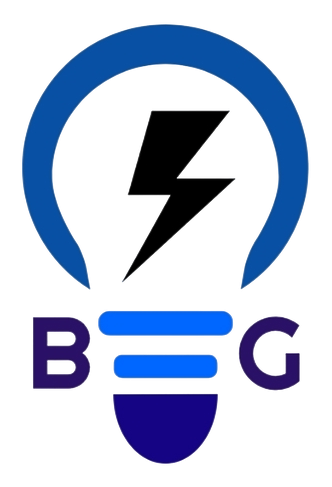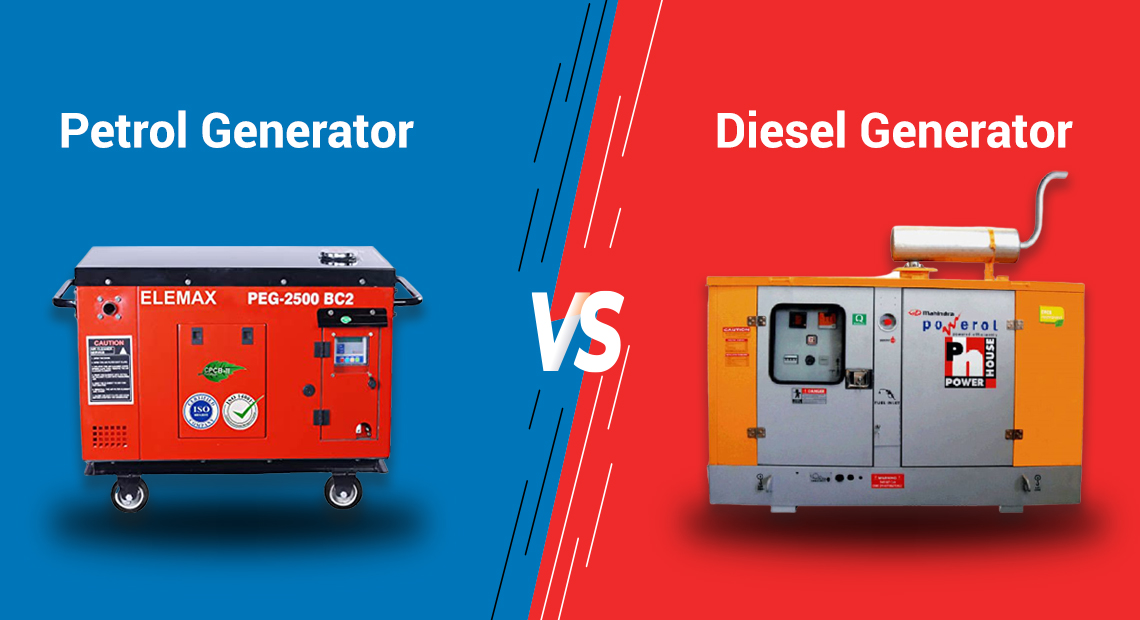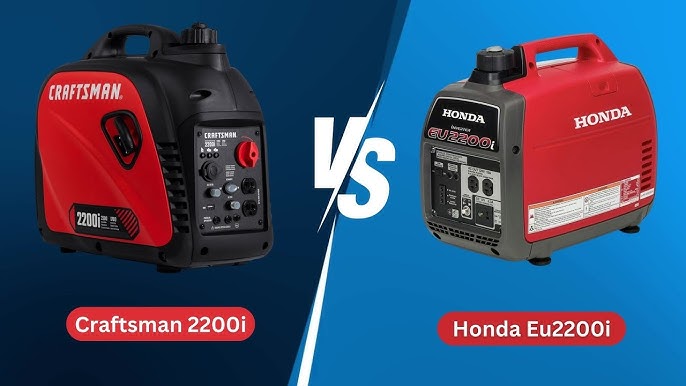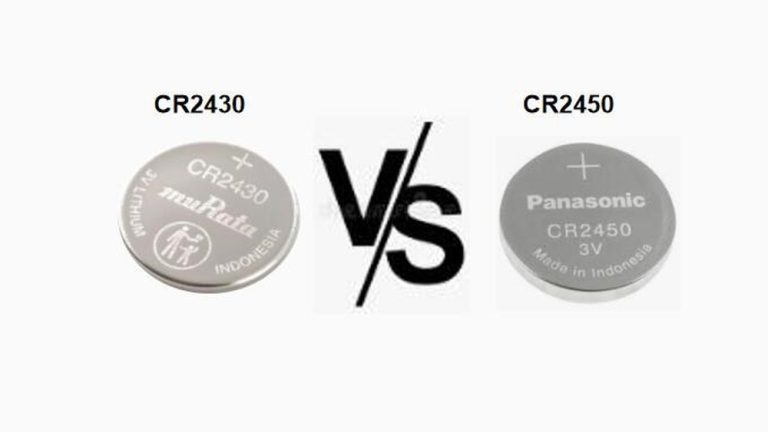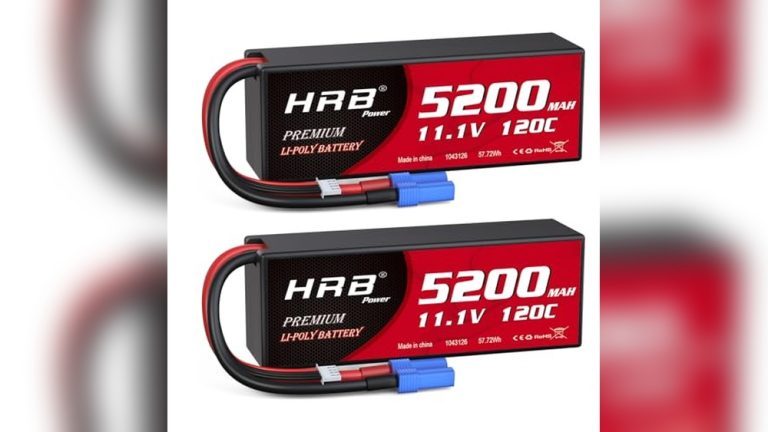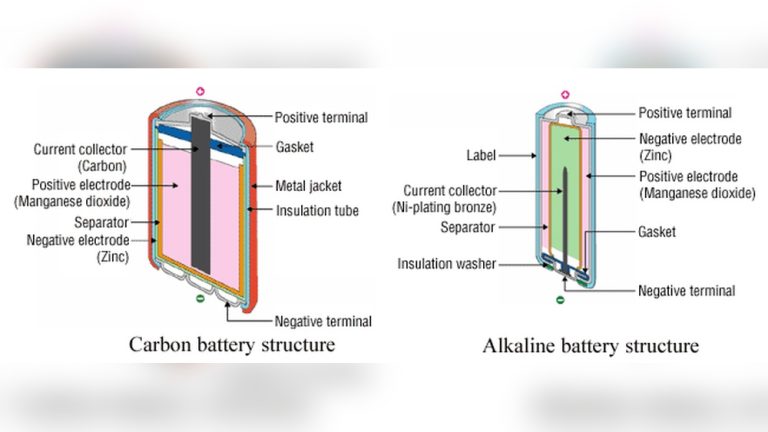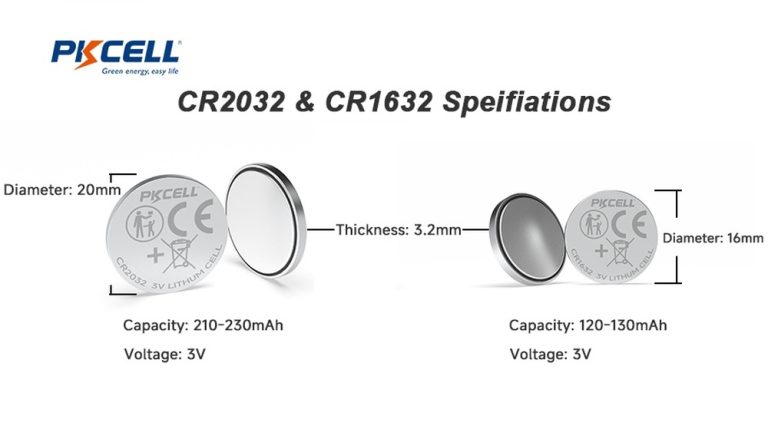Diesel Generator Vs Petrol Generator: Which One is Best for You?
Generators are essential for backup power. Two common types are diesel and petrol generators.
Deciding between a diesel generator and a petrol generator can be tricky. Both have their unique benefits and drawbacks. Understanding these differences helps you choose the right one for your needs. In this post, we will compare diesel and petrol generators.
This comparison aims to provide insights into their performance, costs, and suitability for various applications. By the end, you’ll have a clearer idea of which generator fits your requirements best. Whether you need a reliable power source for home, business, or outdoor activities, this guide will help you make an informed decision. Let’s dive in and explore the key differences between diesel and petrol generators.
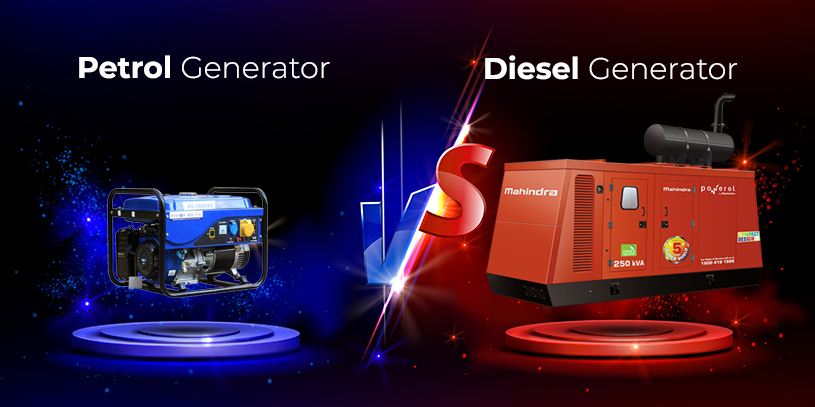
Credit: pioneergenerator.in
Introduction To Generators
Generators are essential devices that provide power during outages. They convert mechanical energy into electrical energy. This energy powers homes, businesses, and other critical systems. Understanding the types of generators helps in making an informed decision.
Purpose And Uses
Generators serve various purposes. Their primary role is to supply electricity during power cuts. This keeps essential systems running smoothly.
Some common uses include:
- Emergency backup for homes
- Power supply for businesses
- Construction sites
- Outdoor events
- Remote locations
Importance Of Choosing The Right Type
Choosing the right generator is crucial. It ensures reliable power supply and efficiency. Two common types are diesel and petrol generators.
Consider these factors when choosing:
| Factor | Diesel Generator | Petrol Generator |
|---|---|---|
| Fuel Efficiency | More fuel-efficient | Less fuel-efficient |
| Cost | Higher initial cost | Lower initial cost |
| Maintenance | Less frequent maintenance | More frequent maintenance |
| Noise Level | Quieter | Louder |
Fuel efficiency impacts long-term costs. Diesel generators are more efficient. They consume less fuel over time.
Initial cost is another factor. Diesel generators usually cost more upfront. Petrol generators are cheaper to buy.
Maintenance needs vary. Diesel generators need less frequent maintenance. Petrol generators require more regular servicing.
Noise levels differ too. Diesel generators are typically quieter. Petrol generators tend to be noisier.
Understanding these factors helps in making the right choice. It ensures you have a reliable power source that suits your needs.
Diesel Generators
Diesel generators are a popular choice for backup power. They are reliable and efficient. Many industries trust diesel generators for their power needs.
How They Work
Diesel generators convert fuel into electrical power. The engine burns diesel to produce energy. This energy turns an alternator. The alternator generates electricity. This process is simple and effective.
Key Features
Diesel generators have many key features. They are fuel-efficient. Diesel fuel burns slower than petrol. This means longer run times. They are also durable. Diesel engines last longer than petrol engines. This makes them a cost-effective choice.
Another feature is their reliability. Diesel generators start up quickly. They provide power during emergencies. They are also easy to maintain. Regular checks and fuel refills keep them running smoothly.
Diesel generators come in various sizes. Small models power homes. Large models power industrial sites. They are versatile and adaptable.
Safety is another key feature. Diesel fuel is less flammable than petrol. This reduces the risk of fire. Diesel generators are safe to use in different environments.
Petrol Generators
Petrol generators are a common choice for many users. They are known for their portability and ease of use. These generators are often used for small to medium power needs. Let’s dive into how they operate and their main characteristics.
How They Operate
Petrol generators use a petrol engine to produce electricity. The engine burns petrol to create mechanical energy. This energy turns an alternator, which generates electrical power. The process is simple and efficient for short-term use.
Here is a step-by-step explanation:
- The engine starts and burns petrol.
- The burning fuel creates mechanical energy.
- This energy turns the alternator.
- The alternator generates electrical power.
The generator then delivers this power to connected devices.
Main Characteristics
Petrol generators have several key features. They are typically lightweight and portable. This makes them ideal for outdoor activities. They are also easy to start and operate.
| Feature | Detail |
|---|---|
| Fuel Type | Petrol |
| Portability | High |
| Ease of Use | Easy to start |
Petrol generators are often quieter than diesel ones. They are suitable for residential areas. Noise levels are an important consideration.
Here are some advantages of petrol generators:
- Lightweight and portable
- Easy to start
- Less noisy
Petrol generators have some limitations. They usually have a shorter lifespan. Maintenance is required more often. Fuel costs can be higher compared to diesel. These factors are important to consider when choosing a generator.
Performance Comparison
Choosing between a diesel generator and a petrol generator can be challenging. The decision often boils down to performance. Let’s explore how these generators stack up in terms of fuel efficiency and power output.
Fuel Efficiency
Fuel efficiency is crucial for long-term running costs. Diesel generators are known for their superior fuel efficiency. They consume less fuel compared to petrol generators, making them more cost-effective in the long run.
Here is a quick comparison:
| Generator Type | Fuel Consumption (liters per hour) |
|---|---|
| Diesel Generator | 0.28 – 0.31 |
| Petrol Generator | 0.45 – 0.55 |
As the table shows, diesel generators use less fuel per hour. This makes them ideal for prolonged use.
Power Output
Power output is another critical factor. Diesel generators usually offer higher power output than petrol generators. This makes them suitable for industrial applications and large-scale operations.
Consider these points:
- Diesel Generators: Provide steady and high power output.
- Petrol Generators: Suitable for smaller, less demanding tasks.
If you need a generator for heavy-duty work, a diesel generator is the better choice. For lighter, occasional use, a petrol generator may suffice.
To summarize:
- Diesel generators are more fuel-efficient and cost-effective.
- They offer higher power output suitable for industrial use.
- Petrol generators are better for small-scale, less demanding tasks.
Consider these factors when choosing a generator that best meets your needs.
Cost Analysis
When choosing between a diesel generator and a petrol generator, understanding the cost implications is crucial. This section provides a detailed cost analysis to help you make an informed decision. We’ll look at the initial purchase cost and maintenance expenses of both types of generators.
Initial Purchase Cost
Diesel generators often have a higher initial purchase cost. They are built for durability and long-term use. The robust design adds to their price tag. Petrol generators, on the other hand, are generally more affordable. They suit those with a limited budget. The lower upfront cost makes them attractive for short-term or occasional use.
Maintenance Expenses
Maintenance expenses vary between diesel and petrol generators. Diesel generators have lower maintenance costs over time. They require fewer repairs and are more fuel-efficient. This makes them cheaper to run in the long run. Petrol generators need more frequent maintenance. Their components wear out faster, leading to higher repair costs. Petrol engines consume more fuel, adding to their running costs.
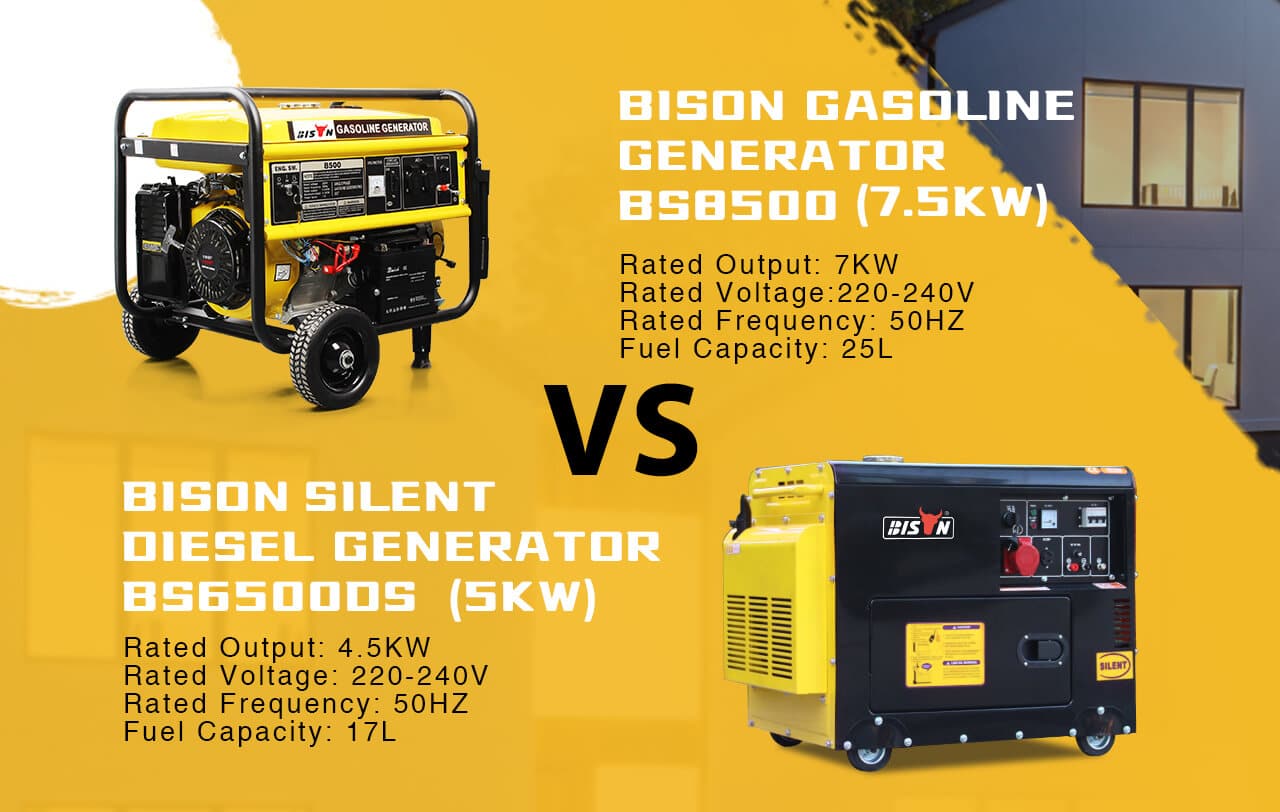
Credit: www.bisonindustry.com
Environmental Impact
Choosing between a diesel generator and a petrol generator can be tough. One major factor to consider is the environmental impact. Let’s break down the environmental effects of both types of generators.
Emissions
Diesel generators produce more carbon dioxide (CO2) compared to petrol generators. This is due to the higher energy density of diesel fuel. Diesel engines also emit more nitrogen oxides (NOx) and particulate matter, which are harmful pollutants.
On the other hand, petrol generators emit less CO2 but produce more carbon monoxide (CO), which is a poisonous gas. Although both types of generators have their own emission issues, diesel engines are generally considered worse for the environment due to their higher levels of NOx and particulates.
Noise Levels
Noise pollution is another critical aspect of environmental impact. Diesel generators are known to be much louder than petrol generators. The noise from a diesel generator can be disruptive, especially in residential areas. This high noise level is due to the combustion process in diesel engines, which is more intense.
Petrol generators are relatively quieter. Their engines operate more smoothly, producing less noise. Therefore, if noise is a concern, petrol generators might be a better choice. Below is a comparison table for a quick overview.
| Type of Generator | CO2 Emissions | NOx Emissions | Particulate Emissions | CO Emissions | Noise Levels |
|---|---|---|---|---|---|
| Diesel | High | High | High | Low | High |
| Petrol | Medium | Low | Low | High | Low |
In summary, each generator type has distinct environmental impacts. Diesel generators emit more harmful pollutants and are noisier. Petrol generators produce less harmful emissions but emit more CO. They are also quieter. Choose based on what matters most to you and your surroundings.
Suitability For Different Needs
Choosing the right generator depends on your specific needs. Diesel and petrol generators both have their strengths. Understanding their suitability can help you make the best decision for your needs.
Residential Use
For home use, petrol generators are often preferred. They are typically quieter and smaller. This makes them more suitable for residential areas. Petrol generators are also easier to start. They are ideal for occasional use during power outages.
Diesel generators, on the other hand, are more fuel-efficient. They last longer with regular use. If you need a generator for frequent power cuts, a diesel generator could be a better choice. They are, however, noisier and bulkier than petrol generators.
Commercial And Industrial Use
Diesel generators are the go-to for commercial and industrial use. They are more robust and reliable. Diesel generators can handle large loads for extended periods. Businesses often choose them for their durability and efficiency.
Petrol generators are less suited for heavy industrial use. They are better for small businesses with limited power needs. Petrol generators are also more portable. They are useful for temporary sites or events.
In summary, the choice between diesel and petrol generators depends on your specific needs. Residential users may prefer petrol for its convenience. Commercial and industrial users benefit more from diesel’s durability and efficiency.
Pros And Cons Summary
Choosing between a diesel generator and a petrol generator can be difficult. Both have their own advantages and disadvantages. Understanding these can help you make an informed decision. Below, we break down the pros and cons of each type.
Diesel Generator Advantages
Diesel generators are known for their durability. They last longer than petrol generators. They also require less maintenance. This makes them a reliable choice for long-term use. Diesel engines are more fuel-efficient. They consume less fuel compared to petrol engines. This can lead to cost savings over time.
Diesel generators are also safer. Diesel is less flammable than petrol. This reduces the risk of fires. Additionally, diesel engines produce more power. They are better for heavy-duty applications.
Petrol Generator Advantages
Petrol generators are usually cheaper to purchase. This makes them accessible for many users. They are also lighter and more portable. This is useful for activities like camping or outdoor events.
Petrol engines start more easily in cold weather. This is an advantage in colder climates. They also run more quietly. This can be important in noise-sensitive environments.
Petrol generators have a simpler design. This makes them easier to repair. Parts are more widely available. This can reduce downtime and repair costs.
Final Decision
Deciding between a diesel generator and a petrol generator can be challenging. Each has its own benefits and drawbacks. This section will help you make an informed decision by examining key factors.
Factors To Consider
Several factors influence the choice between a diesel generator and a petrol generator. These include cost, fuel efficiency, maintenance, and lifespan. It is important to weigh each factor based on your specific needs and usage.
Cost is a significant consideration. Diesel generators usually have a higher upfront cost. Petrol generators, on the other hand, tend to be cheaper initially. But, their running costs can be higher over time.
Fuel efficiency is another key factor. Diesel generators are generally more fuel-efficient. They consume less fuel and provide more power. Petrol generators, while easier to refuel, are less efficient in fuel consumption.
Maintenance is crucial for both types. Diesel generators require regular maintenance but have longer intervals between services. Petrol generators need more frequent servicing and can wear out faster.
Lifespan is also essential. Diesel generators typically last longer. They are more durable and robust. Petrol generators have a shorter lifespan and may need replacement sooner.
Making Your Choice
After considering these factors, make your choice based on your priorities. If long-term savings and durability are important, a diesel generator is a good option. For lower initial costs and ease of refueling, a petrol generator may suit you better.
Think about your power needs. For high power demands, diesel generators are more suitable. For occasional use or smaller power needs, a petrol generator might be enough.
Consider the environment where you will use the generator. Diesel generators are better for outdoor and industrial use. Petrol generators are more suitable for residential or light commercial use.
Your final decision should align with your specific needs and circumstances. By carefully evaluating these factors, you can choose the right generator for your situation.

Credit: www.solentpower.co.uk
Frequently Asked Questions
What Are The Main Differences Between Diesel And Petrol Generators?
Diesel generators are more fuel-efficient and durable. Petrol generators are quieter and cheaper initially. Diesel engines have longer lifespans, while petrol engines are easier to maintain.
Which Generator Is More Cost-effective?
Diesel generators are generally more cost-effective in the long run. They consume less fuel and require less frequent maintenance compared to petrol generators.
Which Generator Is Quieter?
Petrol generators are typically quieter than diesel generators. Diesel engines produce more noise due to their higher compression ratios and larger size.
Which Generator Has A Longer Lifespan?
Diesel generators have a longer lifespan compared to petrol generators. Their robust build and efficient cooling systems contribute to their durability.
Conclusion
Choosing between diesel and petrol generators depends on your specific needs. Diesel generators offer better fuel efficiency and longevity. Petrol generators are more affordable and quieter. Consider your budget, usage, and maintenance preferences. Both options have their pros and cons.
Evaluate which benefits matter most to you. Always prioritize safety and reliability. Make an informed decision for your power needs. This ensures you get the best value and performance. Happy powering!
